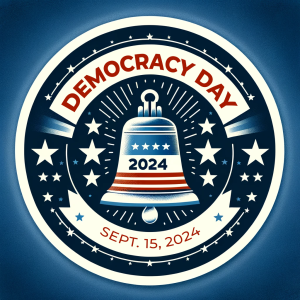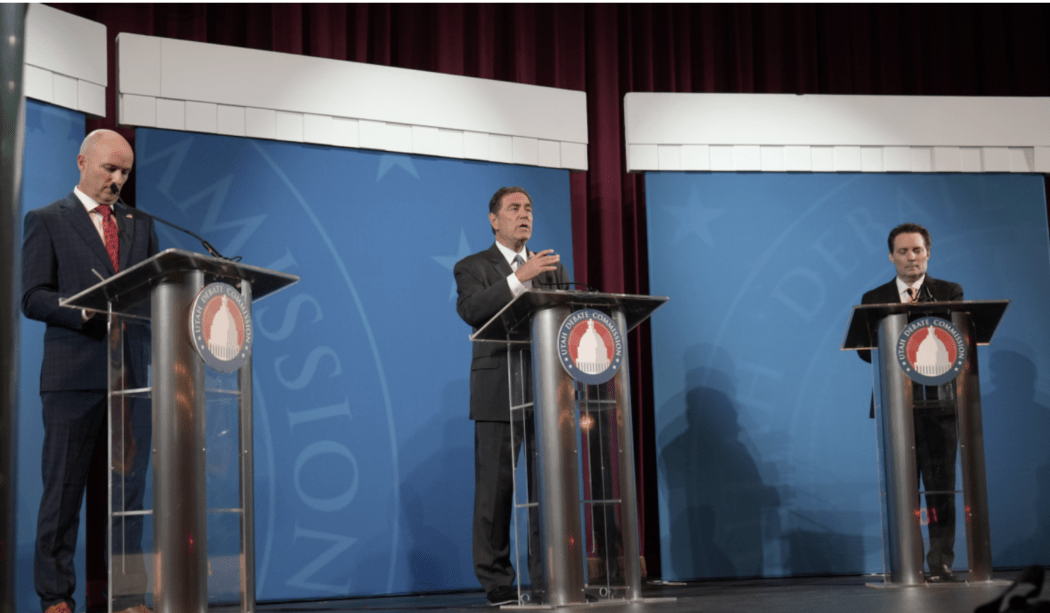Utah’s Fiery 2024 Gubernatorial Debate
Incumbent Republican Gov. Spencer Cox, Democratic challenger Rep. Brian King, and Libertarian candidate Robert Latham each presented their vision for the state.
This story is published as part of U.S. Democracy Day and the Utah College Media Collaborative, a cross-campus project bringing together emerging journalists from Salt Lake Community College, the University of Utah, Utah State University and Utah Tech University.
Utah’s three leading gubernatorial candidates took to the stage at Salt Lake Community College’s Grand Theater on Wednesday, engaging in a debate that covered topics ranging from bipartisanship to housing and energy.
Incumbent Republican Gov. Spencer Cox, Democratic challenger Rep. Brian King, and Libertarian candidate Robert Latham each presented their vision for the state, with sharp exchanges highlighting their differing approaches to Utah’s future.
King kicked off the debate with a call for bipartisanship and a criticism of current leadership.
“You deserve better,” he said. “You deserve bipartisanship not unchecked power.”
Looking for his second term, Cox focused on his achievements in office, highlighting specific tax cuts and teacher raises while criticizing King.
“We’ve accomplished so much together … the largest tax cut in our state’s history, despite my democratic colleague voting against it,” Cox said.
The debate often turned into a two-person sparring match between Cox and King, reflecting broader tensions between the Democratic opposition and the Republican supermajority that controls Utah’s Legislature. The contrast between the two candidates was apparent as they traded barbs over the current administration’s policies.
Latham, a political outsider, emphasized his role as an underdog.
“I am running to be your liberator,” he said, positioning himself against the traditional two-party system. Though less of a direct participant in the back-and-forth, Latham’s presence on stage marked a rare inclusion for a third-party candidate in a major Utah gubernatorial debate.
Bipartisanship and Polarization
King accused Cox of inconsistency in his approach to bipartisanship, particularly criticizing the governor’s recent endorsement of Donald Trump.
“Our current governor said he wouldn’t support Trump, and two months ago, he flipped,” King said.
Cox defended his shift, saying it reflected the will of Utah voters who largely support Trump.
“It’s sad that my colleague would dismiss the vast majority of voters in our state who support the former president,” Cox said.
For his part, Latham argued that the polarization stemmed from the two-party system itself.
“It’s historic that a third-party candidate has made this stage,” he said, calling for less government intervention.
Economic Growth and Energy Policy
On Utah’s economic growth, Cox described his term as a success story, pointing to the state’s prosperity under his administration as proof that his policies were working.
“Utah has led the nation in economic growth,” he declared, even joking, “I’d love to build a wall around Utah and make California pay for it.”
King countered that the benefits of Utah’s growth haven’t reached everyone.
“For people who are struggling, statistics don’t mean anything,” he said, pledging to focus on everyday Utahns if elected.
Energy policy was another point of contention. While acknowledging the importance of the market, King pushed for more aggressive environmental measures.
“Renewable energy isn’t the future; it’s the present,” King said.
Cox agreed that the free market was crucial but argued for the inclusion of nuclear power to meet growing demand.
Latham, however, took a broader stance, advocating for an “everything above” energy policy and supporting various energy sources.
Housing and Constitutional Amendments
The state’s housing crisis also sparked a lively discussion. Cox touted his administration’s plan to build 35,000 starter homes by 2028.
“We have a plan; we have legislation,” he said.
King expressed skepticism, asking why so many Utahns still struggle to buy homes despite these promises.
Latham took aim at what he described as “crony developer capitalism” and promoted a free-market approach to building.
Amendment D, which could give lawmakers more power to repeal or amend voter-passed initiatives, was a particularly contentious issue.
King and Latham both opposed the amendment, calling it a power grab. Cox, who did not say how he’d be voting on the amendment, said it was important to protect the state’s initiative process, adding that he had little influence over constitutional amendments.
“I don’t get an opportunity to weigh in on this at all,” Cox said. “I don’t even get to call them into session. I think on balance, it’s worth supporting, but it’s close.”
King accused Cox of misleading the public, pointing out that while the governor doesn’t sign constitutional amendments, he had approved bills enabling the amendment’s placement on the ballot.
Utahns will get to vote for their next governor on Nov. 5.
Emerson Hagy reported and wrote this story as a journalism student with The Daily Utah Chronicle at the University of Utah. His article is part of U.S. Democracy Day, a nationwide collaborative on Sept. 15, the International Day of Democracy, in which news organizations cover how democracy works and the threats it faces. To learn more, visit usdemocracyday.org.


